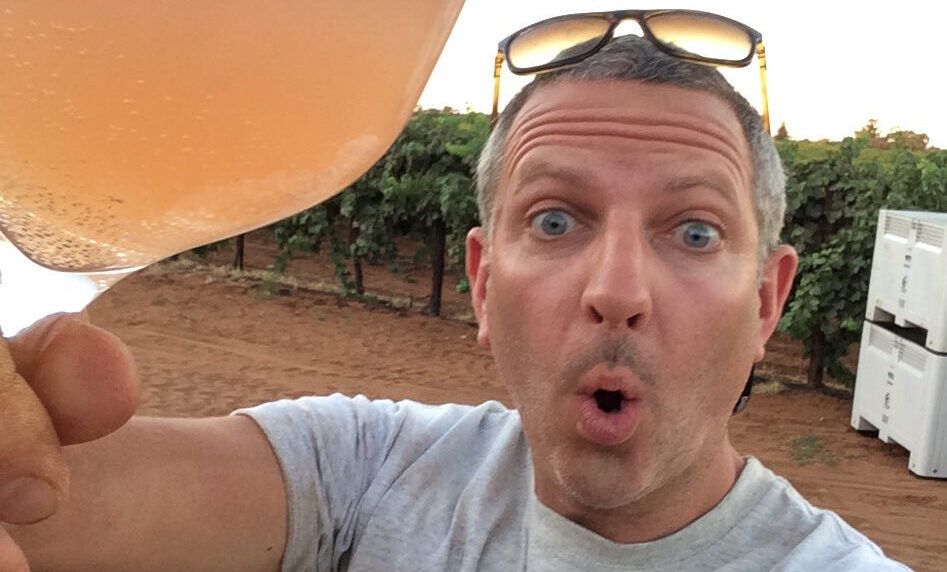“The wine world is infamously busy, fragmented and noisy. If you’re small, even tiny, being disruptive, and truly original, is the only way to cut through the crowd and get you noticed.” Here’s how Tim Wildman MW has set out to make a difference.
You bill yourself as the world’s most disruptive MW – what do you mean by that?
I do, and to be truly disruptive you need to be an outsider, you can’t disrupt the establishment if you’re a part of it.
I went into the wine industry straight out of university having read English literature, I started as a graduate trainee at Oddbins in Bristol in 1992. I loved the business, the travel, the people, and of course a good drink, but I was never really into wine like some of my vintage chart obsessed peers. I’d rather read Jilly Cooper than Decanter.
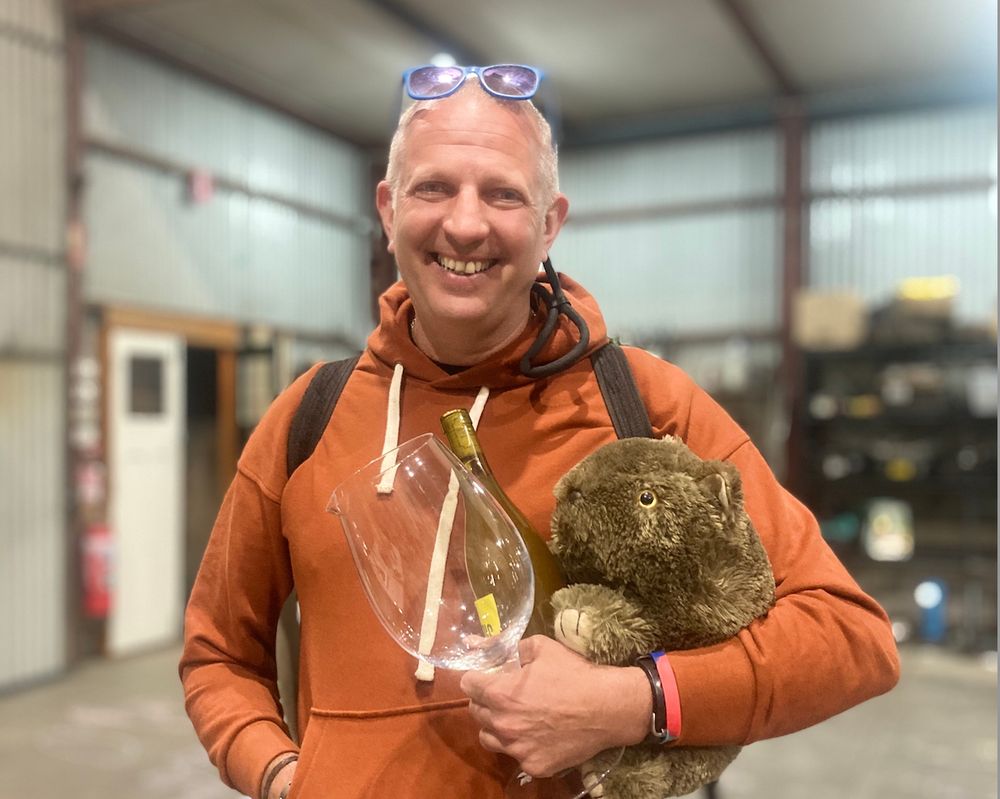
Tim Wildman MW has come a long way from his early days in the wine industry when he felt very much an outsider. A feeling he has had throughout his wine career and has helped drive what has turned him to an impressive and inspiring entrepreneur
I remember going to the London Wine Fair in the 1990s and being elbowed aside by men in pinstripe suits. For the first 10 years or so of my career I thought my lack of academic interest in wine, and poverty of pinstripe status, was a weakness, but eventually I think it turned into a strength. Our industry has changed a lot in the last 30 years, there are a lot less pinstripe suits. But there’s still a huge amount of work to be done to make our industry more welcoming to those who are different or outsiders. If climate change is the external existential threat to our industry this century, then lack of diversity is the internal one.
But as a Master of Wine do you not not now feel part of the wine trade’s establishment?
I studied for and passed the Master of Wing qualification in the mid 2000s as my way to escape the life of a salaried employee. In 2009 I was planning my first business, James Busby Travel, and the third studio album from Kasabian came out, West Ryder Pauper Lunatic Asylum.
The opening track is called Underdog. To plan the first Busby trip I flew to Australia five times in two years, all on my own coin, and whilst still holding down a full time job as the Aussie buyer for Les Caves de Pyrene. I played that album to death as I drove the backroads of Victoria and South Australia trying to talk the project into existence.
I was the Underdog.
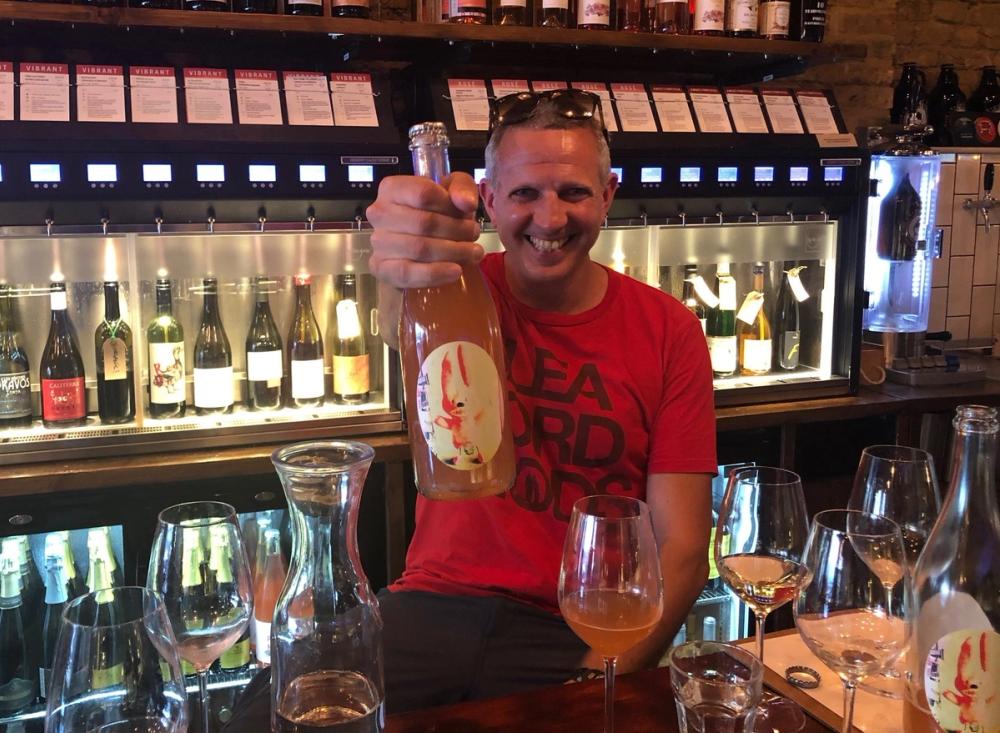
Tim Wildman MW with one of the first versions of his breakthrough Australian pét nat wine brand – Astro Bunny – now sold in 16 countries
Then in 2013 I quit my day job and bought a one way ticket to Adelaide, to fulfil my dream of an Australian summer by the beach in McLaren Vale, where I spent six years living out of a suitcase and sofa-surfing to be able to set up my Wildman Wine business (Astro Bunny and Piggy Pop pét-nats).
At the same time I was establishing WineTutor.tv, the educational video website for MW students, filming in the United States, Europe, New Zealand and Australia, all done on a shoe string, all self-funded. Still playing Underdog.
In 2018 I came back to the UK and established Lost in a Field, my English pét-nat business, using heritage grape varieties and abandoned “lost” vineyards.
The maiden 2021 vintage received a full article coverage by Jancis in the FT magazine, Widman Wine is now exported to 16 countries, WineTutor.tv is flying, we’ve making a five film documentary series on sustainability next year, and I no longer have to live out of a suitcase.
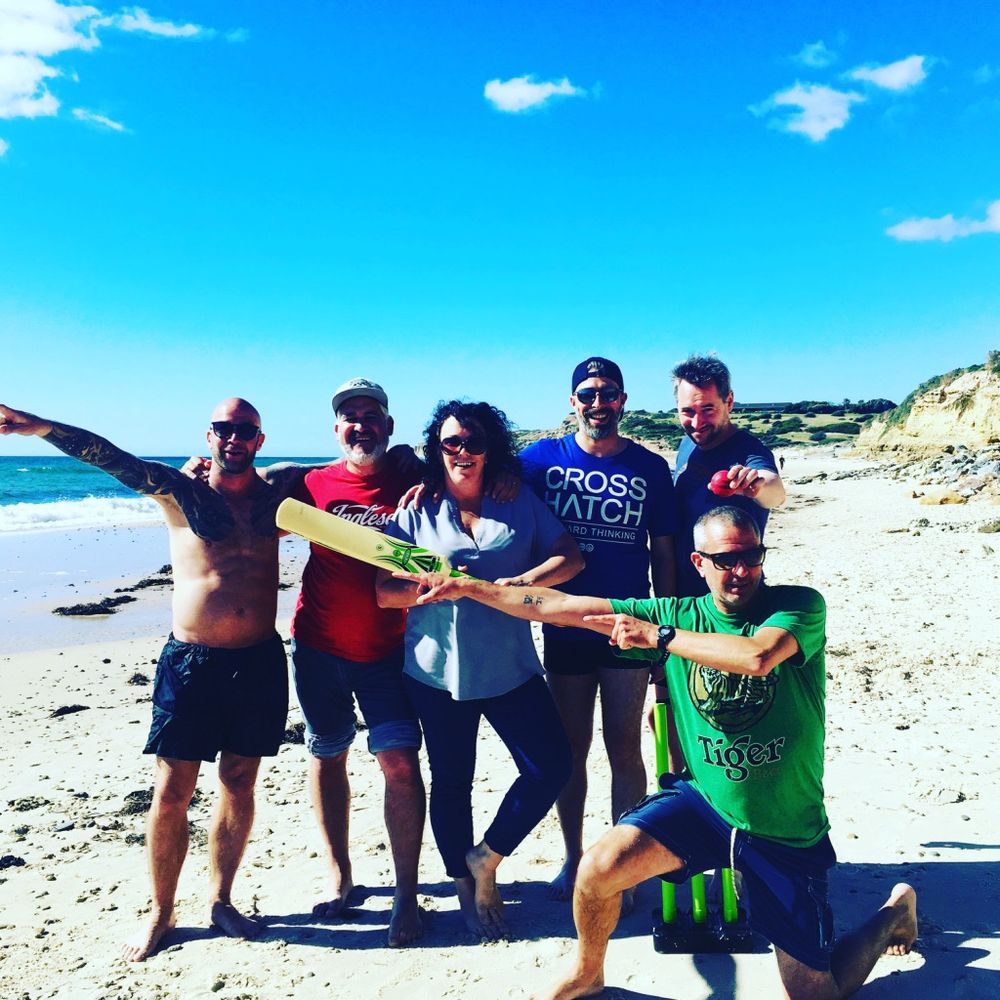
Tim Wildman MW ran his last James Busby Travel wine education trips to Australia last year that has over the years taken many of the next generation of wine leaders to the country
In November this year I ran the first James Busby Travel since before the pandemic, and announced it was the last, that circle is now complete. The week after it finished I drove down to McLaren Vale for a pre-vintage meeting, the same region where I first landed in 2013. I played West Ryder Pauper Lunatic Asylum, but it means something different to me now.
I’ve built some businesses I’m really proud of, and even though I may no longer be the outsider, the underdog, I’ve never lost that feeling inside.
All of my businesses have that underdog hunger, that big start-up energy. They all have challenger status, and a healthy dose of punk rock resolve. Being self employed in this industry is bloody hard, doubly so if you’re not treading the well worn path but trying to do something original and different, dare I say disruptive. It’s that underdog hunger and challenger energy that provides drive and a sense of mission. I don’t know how I’d get up on a Monday morning without that fuelling me.
You have also had to find a way to make each of your projects commercially successful and viable too?
Absolutely, making a profit is key to sustainability and improving quality, in whatever you do. Our trade is plagued by people who work for free, or for next to nothing, it’s the disease of our industry, and drags everyone else down. Judging in wine shows comes to mind. The opposite is also true, I’ve got no time for those who see the wine sector as a vehicle to enhance their own personal status.
It’s really important to me that all of my businesses give back to the industry in some way, or add to the sum of knowledge and move things forward. In a word, it’s important that everything I do has integrity.
What are the key criteria do you think you need to get right to offer something genuinely new and different – or disruptive as you might say?
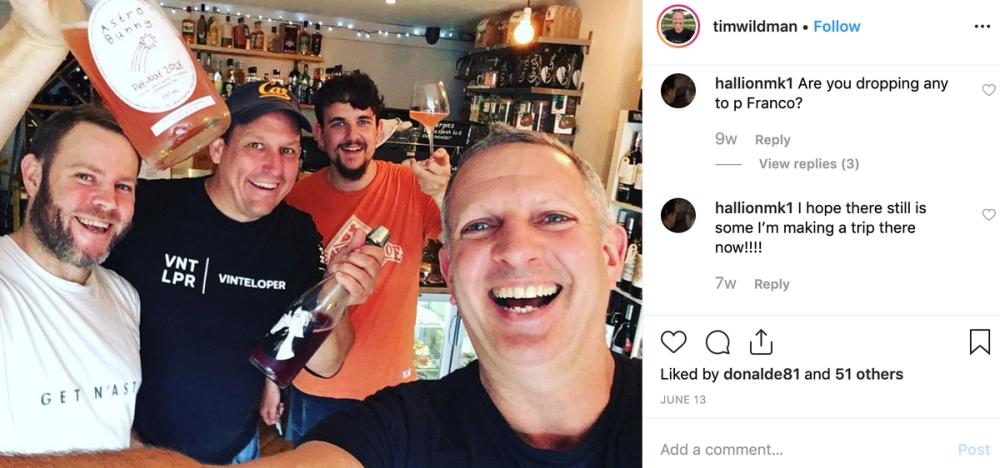
Live and exclusive on Instagram. Tim Wildman MW was one of the first to use Instagram to promote what he was doing with his Astro Bunny wines, often opening them for the first time on a live stream or taking them into wine merchants across Australia and filming their natural responses on tasting the wine for the first time
To paraphrase a line from the film Inception, the most powerful thing in the world is an idea. The classic definition of disruption is a technology or business model that makes the existing models obsolete or out-dated. That’s certainly what I’ve tried to achieve with a number of my businesses, notably James Busby Travel, disrupting and redefining the model of inbound trade trips to Australia, and with WineTutor.tv, developing a different approach to MW student education.
Others, such as my South Australian Astro Bunny pét-natand English Lost in a Field pét-nat are both projects that deliberately disrupted the existing paradigm. The first vintage of Astro Bunny was in 2014, 10 years ago, and was partly in response to voices in the Australian wine industry saying that it was impossible to make wine with no sulphur. Yes, I wanted to make delicious pét-nat, because that’s what I enjoyed drinking, but I also wanted to prove a point.
The English Lost in a Field project is next-level disruption, in an industry defined by traditional method sparkling wines made from the Champagne trio of grapes, corporate Champagne-esque business structures, and marketing to match.
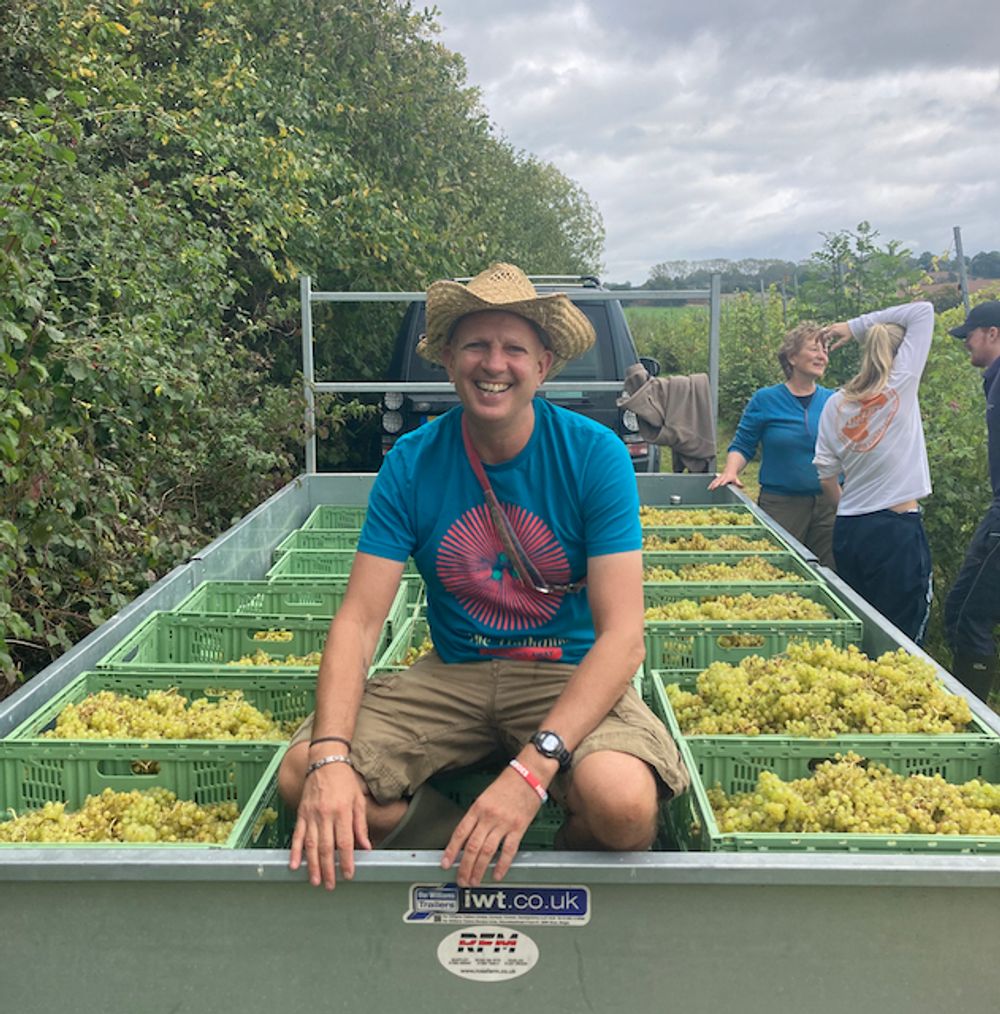
Tim Wildman MW is now bringing his disruptive skills to the English wine industry and both making his own pét nat wines from heritage varieties and is now tracking down un-used stocks of wine to see if they can become commercially viable
Lost in a Field decided to tell a completely different story. We tracked down unfashionable heritage German cross varieties, used volunteers to help save abandoned “lost” vineyards, and crafted the wine into fruity, fun and crucially fault free pét-nat. I can’t be sure, but the 2021 Lost in a Field Frolic pét-natmay well be the only wine that was the entire focus of Jancis Robinson MW’s weekend FT column in it’s maiden vintage.
The wine world is infamously busy, fragmented and noisy. If you’re small, even tiny, being disruptive, and truly original, is the only way to cut through the crowd and get you noticed.
It’s not easy, there’s a reason why the disruptive path is the road less chosen, but in my experience with all my businesses, if the path you choose to walk down is full of potholes and brambles, there’s less chance people will be tempted to follow you down it.
You are also now looking at an urban winery – what can you tell us about that?
I’m afraid that is 100% top secret and I’m under an oath to my businesses partners not to utter a word. Let’s just say it’s due to launch in 2026 and it will be like nothing else you will have seen, in any country, and in ways you can’t begin to imagine. We currently looking for investors, so to anyone reading this, if you want to be involved at the ground floor in the UK’s most exciting new winery project, my door is open.
And you are also looking to work with old and forgotten parcels of English wine – what is your plan there?
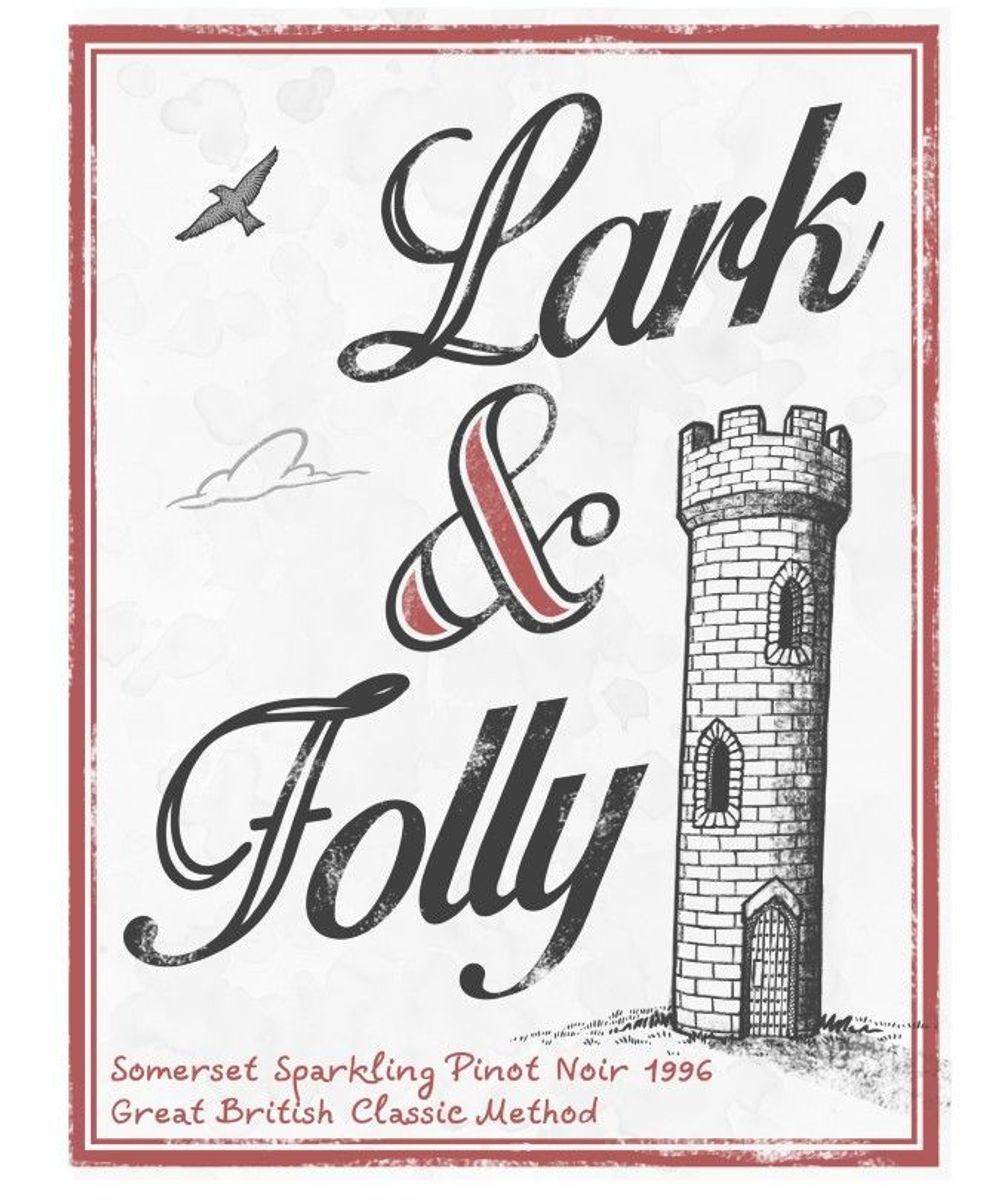
Lark & Folly is the latest idea from Tim Wildman MW – that hopes to bring to life parcels of un-sold English wine
Yes, Lark & Folly was launched in November last year, just in time for Christmas listings.
Whilst I was travelling around the country tracking down old vineyards and heritage varieties for my Frolic pét-nat, I started unearthing some obscure and rather interesting parcels of traditional method wine.
The first parcel was in the shuttered, cobwebbed ballroom of a stately home, the next in the padlocked bond of an abandoned winery, another in the cellars of a deceased estate.
These discoveries were too good to be ignored, and in most occasions the wines were still on their tirage lees, keeping fresh, just waiting to be dusted off, brought into the light of day, disgorged, dosed and labelled for release,
We’ve started with three wines from two estates, a 2010 and 2011 Sparkling Schönburger from a vineyard in the grounds of a stately home on the Kent – Sussex border called Groombridge Place, which ironically has recently been bought by The Pig group, who pulled out the old Schönburger vineyard, which was on its last legs, and I believe are now re-planting.
The other is a 2006 Reichensteiner / Huxelrebe from a vineyard in East Sussex that still exists. When visiting the vineyard on my hunt for heritage varieties, I discovered that the elderly owner happened to have a few thousand bottles of this 2006 in his cellar that he never got round to dis-gorging, let alone selling. As each bottle has been on it’s own journey of development on their yeast lees over the last seventeen years we see a bit of bottle variation, but the wine is remarkably complex and rich.
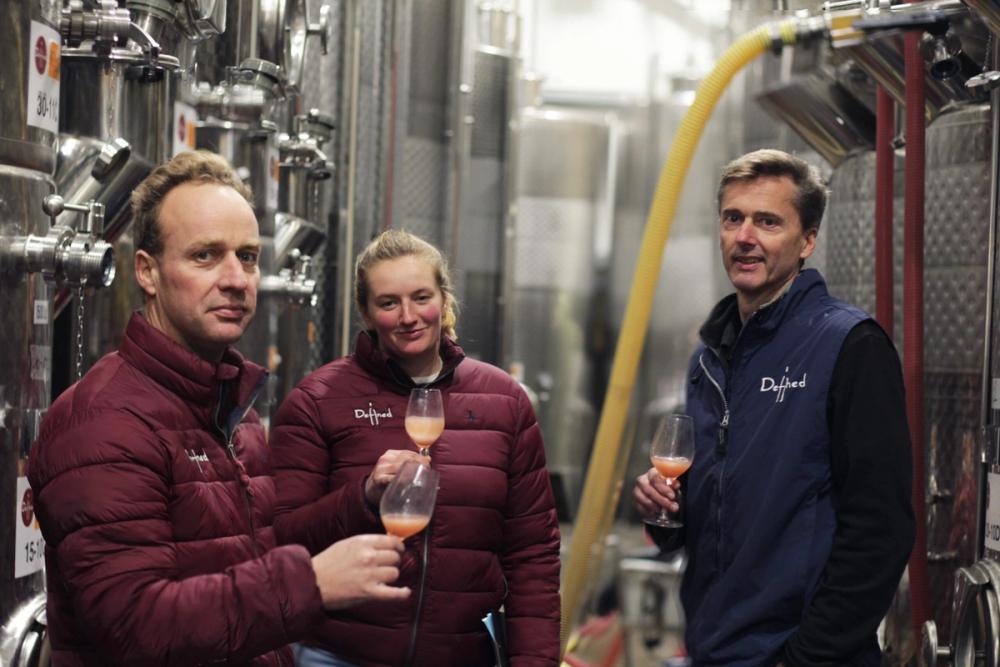
Defined Wine’s team including Nick Lane, head winemaker, Poppy Seeley, operations winemaker and founder Henry Sugden are working with Tim Wildman MW on his Lark & Folly initiative
I work with Henry Sugden and Nick Lane at Defined Wine to clean up the bottles, in some cases having to remove original labels and foils, in other cases riddle, disgorge and decide what level to add as dosage. Nick’s previous role was making Dom Perignon for Moët, so what Nick doesn’t know about polishing up trad method wines isn’t worth knowing.
It’s a really fun project, and I think we’re well positioned to take advantage of the millions of bottles of of English sparkling wine that we all know are sitting in warehouses across the country without a home. No-one is really talking about this surplus, but it’s out there, and growing every year.
So if anyone has a shed full of trad method they need to clear, they are welcome to get in touch. We’re only interested in wines with some age, say 2014 or older, and ideally still on tirage.
What are the most common things you find most rewarding about the different projects you have?
Freedom, that’s the key to being self-employed. I’d rather be starving and free, than be well fed but in a job that made me feel dead inside. Keeping the fridge full, and having fun. After those three, it’s just details,
What are the biggest and most common challenges you come across?
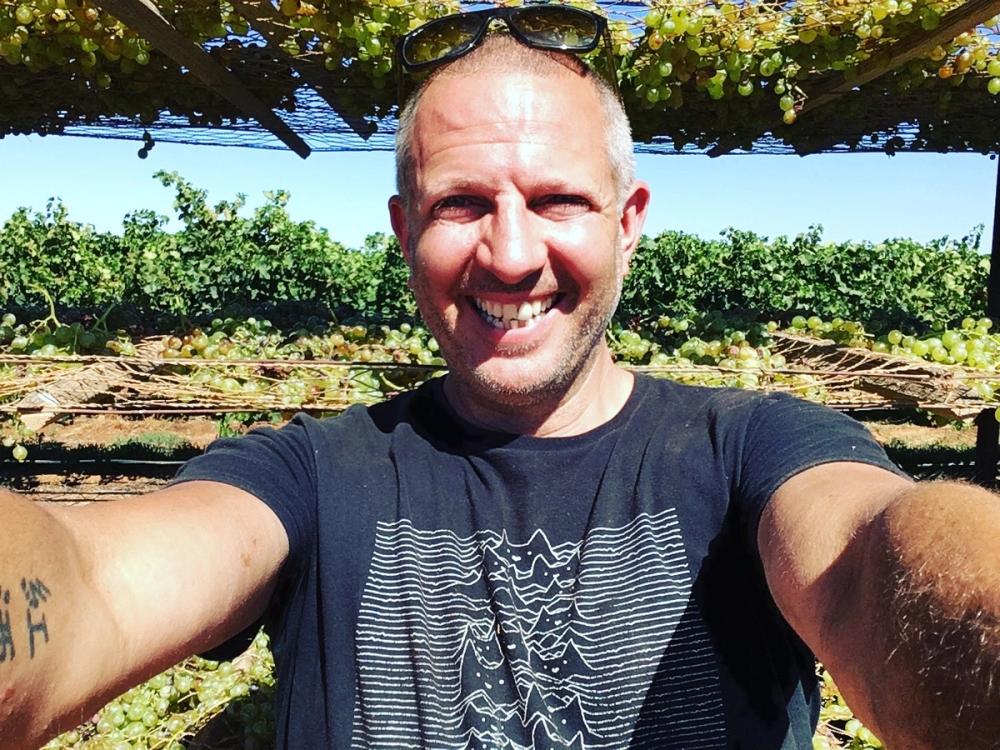
Grin and bear it: Tim Wildman MW says working for yourself can be hard work and require long hours, but the rewards make it all worth while
When I became self employed in 2009 I didn’t have a particularly clear idea of what I wanted to do, I think it’s important to create some white space for opportunities to fill, scary as hell, but important. Too much planning early on can limit your horizons. But I had a very clear list of what I didn’t want, and top of that list was no staff, followed by no boss, with never having to wear a tie coming in third place.
Keeping true to my aim of no staff means that at times I’m having to juggle the equivalent of two full time jobs. There was a period last year when an average day was 12hours, with the occasional 17 hour day thrown in for fun, and you do this by getting up at 4am. But I’d rather go without sleep to get the job done well, then lose sleep because I’m lying awake worrying about staff problems.
It’s not for everyone, but that’s the choice I’ve made, and of course the aim is to always work less but bring in the same money, something that I’m hoping to get better at this year.
How do you get through the tough times?
You have to work harder than other people think is possible. That’s something I learnt to do when studying for the MW. In the final year I passed my Practical (tasting) exam, I tasted so much I actually pulled a muscle in my tongue. I’m not kidding, I couldn’t taste for a week, it was a proper physical injury. It’s no different to elite athletes.
Johnny Wilkinson famously used to practise drop kicks every day of the year, including Christmas Day. I’m sure there was nothing he ever leant when practicing on Christmas Day, but when he had to kick to win in the final phase of play in the 2003 World Cup, he knew that he was the only guy on the field who practiced on Christmas Day. In big pressure moments, that knowledge can make all the difference, it gives you a winning mind set.
Any advice to anyone out there sitting on an idea and not sure how to get it off the ground or go to the next stage and make it happen?
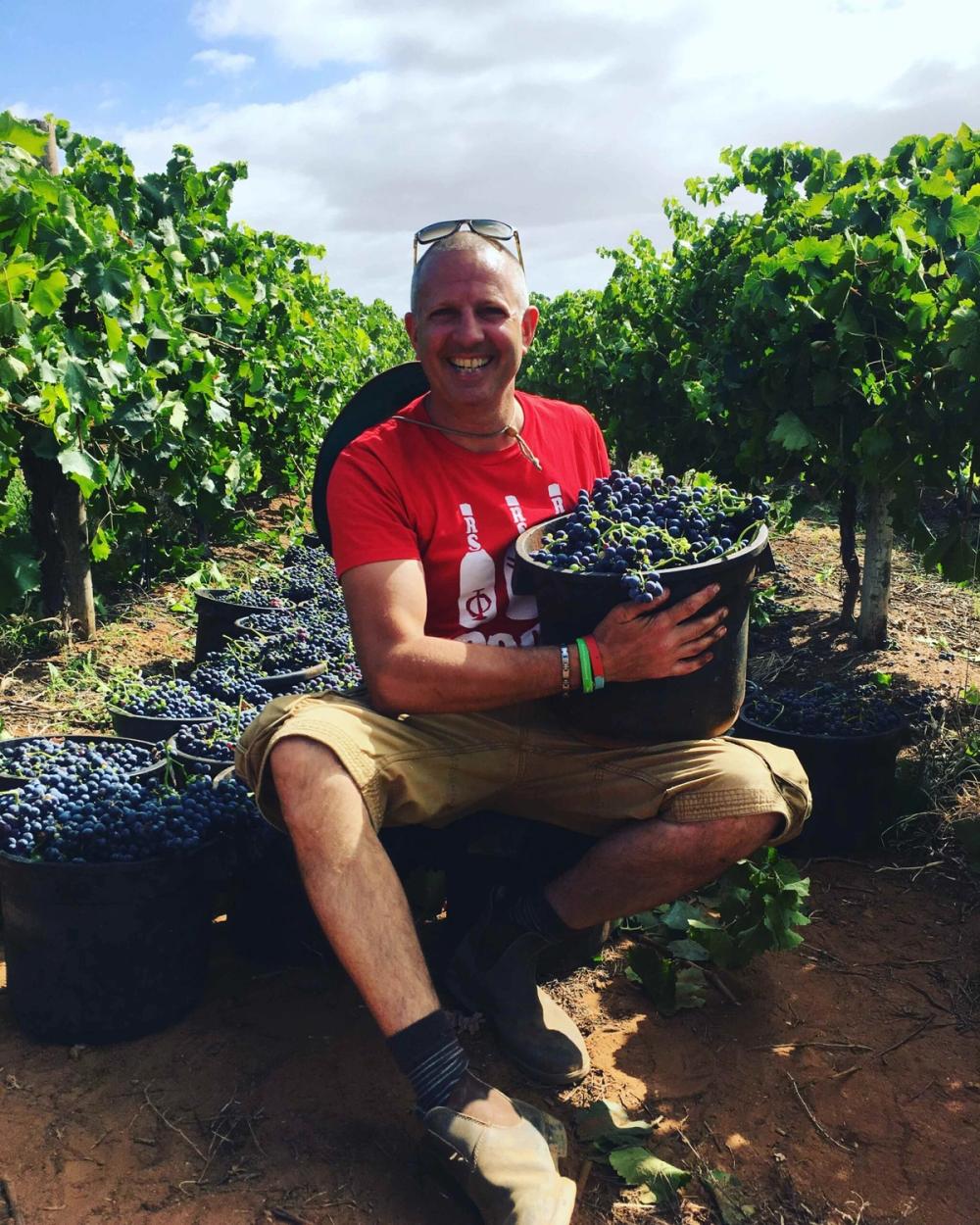
If you have an idea then just get on and do it and keep working on it until you get it right. It worked for The Beatles…
Don’t listen to experts, and don’t pay consultants. And whatever the received wisdom is, don’t listen to what the consumer wants. The consumer has no idea what they want, it’s your job to give them something they didn’t know they wanted.
You need to have a vision, but that vision needs to draw on the widest possible experience, I don’t think there’s a shortcut to the 10,000 hour rule. It worked for The Beatles, during their time in Hamburg they played seven hours a night, for weeks on end. If a band played then the venue could serve alcohol. It forced them to be creative and to become tight in a way that a weekly Friday night gig in Liverpool could never have done, and the rest is history.
My favourite wine is Madiran, traditional styles are uncompromising, a visceral physical experience. Do you think the producers of Madiran ever asked what the consumer wanted? When life gives you ducks, you make Madiran.
Any businesses and individuals you admire in the wine trade who you think are kindred spirits to what you want to do?
I’m not sure about kindred spirits, but I can choose three I admire, from three different generations, and three different disciplines.
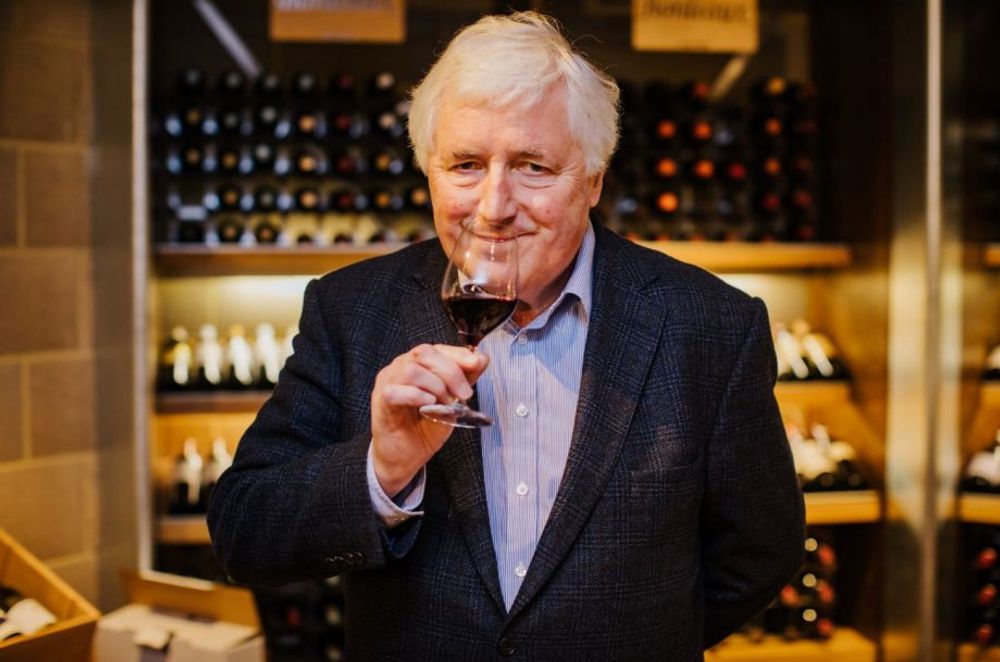
All wine buyers could learn from Sebastian Payne MW says Tim Wildman MW
Sebastian Payne MW, recently retired buyer at The Wine Society. Seb was everything a professional buyer should be, He would insist you always brought bottles to a meeting, he’d then taste the wines with you, and give you immediate feedback. He could communicate on the spot why he did or didn’t like the wine, how it might or might not fit into their range, and if you were lucky, and patient enough, he would give you an order in person. He respected his own time as a buyer, and also yours as a sales rep. I spent over a decade in sales, and I don’t think I met a single buyer who could hold a candle to Sebastian Payne.
From a younger generation, Brodie Meah from London based wine bar, retailer and importer, Top Cuvée. He and his team livetheir business, they are not separate to their customers, they are the same as their customers, they talk the same language, they have a mission to bring wine closer to the people of their generation. And it works. If you can completely collapse the gap between yourself and your customer it’s a magical thing.
As a communicator I would be tempted to choose Andrew Jefford, whose skill is as unmatched as it has been unrewarded. But you already know Andrew, so I’ll pick a future star to watch, Agnese Gintere, who actually recently interviewed Andrew, a video well worth watching on her No Sediment YouTube channel.
Agnese creates consumer facing wine content that recognises that the first duty of a communicator is to entertain, not educate. And if they come for the entertainment they’ll stay for the education. It’s the Top Gear model, 95% entertainment, but when they talked about cars it was never dumbed down.
To paraphrase a Jefford quote “most ordinary people associate wine with laughter and good times, but we rarely see that in how it is communicated”.
Any businesses, or individuals, from outside of wine that inspire you and give you ideas?
Tim Schmidt, founder of the Eden Project, who I first heard talk about the Tinker Bell Principle. In Peter Pan, only the children can see Tinker Bell because grown ups don’t believe she exists. You need to believe in something for it to become reality, and believe it hard.
In business you must believe that everything is possible – because if you don’t, no-one else is going to. Or as one of my other heroes, Ffyona Campbell put it, the possible is not what you can do, but what you want to do.
Anything else to say?
The wine trade is a classical orchestra trying to play pop songs. Most of the time it’s out of tune with its audience.
All of my businesses, whether it’s Australian trade tours with James Busby Travel, Master of Wine student education with WineTutor.tv, or making fun, fruity and fault-free pèt-nats with Wildman Wine or Lost in a Field, are my attempt to play pop tunes, with a punk rock attitude. And this brings me back to my initial point, diversity is the key to survival, we won’t play better tunes until we change the band members.
If you want my philosophy in a nutshell, I like this quote from Antony Bourdain.
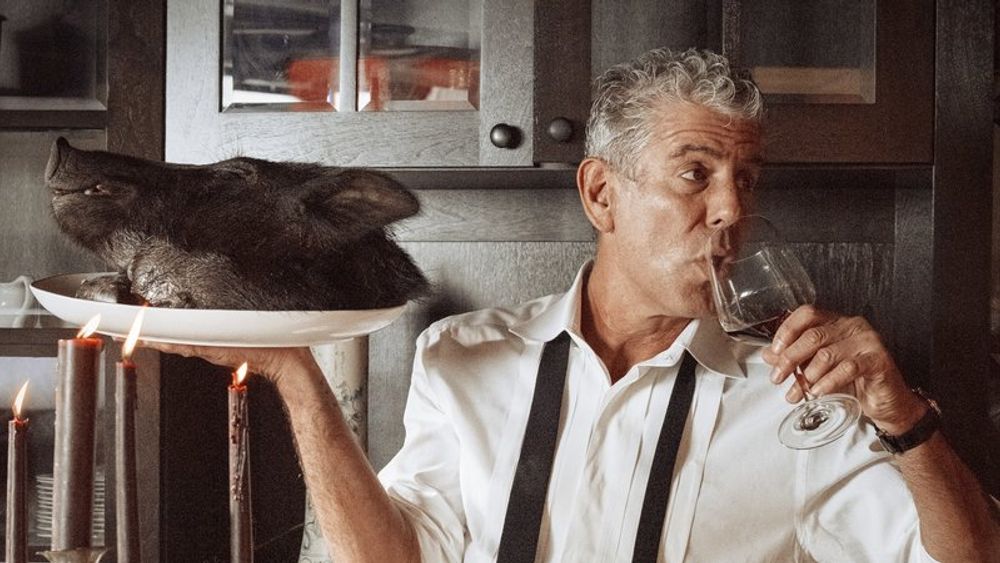
Antony Bourdain sums up Tim Wildman’s attitude to making wine interesting – it is all about the experience of drinking it and not making it that is interesting…
“I think people somehow expect me to have better taste in beer than whatever generic green bottle I happen to be grabbing. And they see that I’m passionate about food, why am I not passionate about beer? I just ain’t. I’m just not. It’s why we generally don’t do winery scenes or brewery scenes. Because no matter how good it is—this might be one of only five remaining bottles left on Earth, Napoleon may have put it in the bottle—but visually, it’s red stuff going into a glass. There’s nothing to differentiate it from a big box of Gallo. It’s just not visually interesting. And also, I don’t really care. Even with wine, I’m happy, maybe even happier, drinking some local stuff at an agriturismo. Wine nerds usually bore me. Don’t talk abut your damn wine, drink it. I’d rather order a Burgundy, not knowing what I’m doing. Let’s see. They’re so unpredictable. I know nothing about them. It’s always a surprise. Spin the wheel. Some of them suck, some of them are going to be good, some will be interesting—that’s interesting to me.”
- You can find out more about and catch up with all the latest developments with Tim Wildman MW’s various projects at his main website here.
